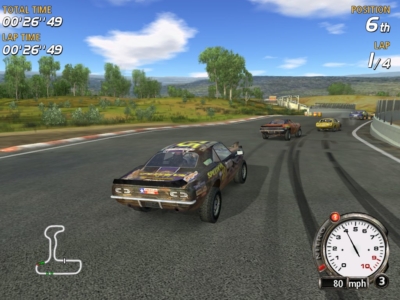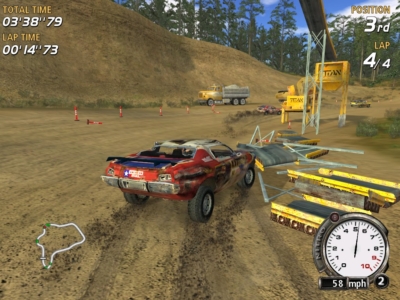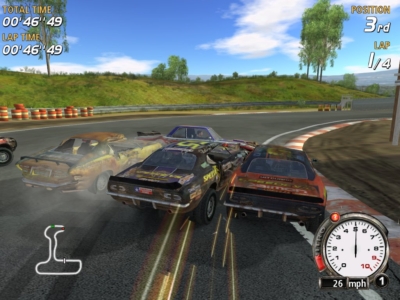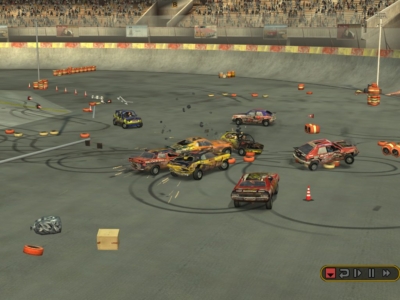
FlatOut
Written by: Rik
Date posted: September 26, 2012
- Genre: Racing
- Developed by: Bugbear
- Published by: Empire Interactive
- Year released: 2004
- Our score: 7
A quick glance at anything FlatOut related, without playing the game, will lead you to anticipate some madcap hi-jinks: cars on fire, debris everywhere, and – the series’ trademark – drivers being catapulted through windscreens. But, while you certainly will witness all of those events while playing, it’s a more low-key affair than you might expect.
Developer Bugbear had previously brought us the moderately-enjoyable Rally Trophy, and you can certainly see the roots of that game here. Both are largely about maintaining concentration while driving through either mud, gravel or snow, and the handling model seems to have been retained, too, with the same lack of traction on slippery surfaces forcing a more considered approach than you might otherwise employ in a knockabout arcade racer. In FlatOut, just as in Rally Trophy, you’ll find yourself approaching a corner too quickly and desperately slamming on the brakes, to no avail, as you sail past the corner and into some trees, a ditch, or some other off-track hazard while swearing profusely.

In contrast to all the other, extremely slippery, surfaces, you can really throw the car around on tarmac with almost no need to brake.
It’s not a rally game, though, and so the A-to-B stages are replaced by laps of a circuit and in the place of the classic rally vehicles, we have a selection of generic old bangers seemingly inspired by US muscle cars. Most significantly, there are AI opponents to contend with, and a robust approach is actively encouraged, with the cars remaining in reasonable physical condition for roughly the first ten seconds of each race, until the pack emerges from the first corner in a shower of broken glass and displaced bodywork.
Beyond the natural and largely unavoidable coming-together at the start, it’s generally a bad idea to go out of your way to drive an opponent off the road completely, with an overly combative strategy equally as likely to see you spinning off into the bushes as provide you with any meaningful advantage. Fortunately, your opponents seem to have been programmed to be mindful of too much contact, although they do move more into bastard-mode as you progress, periodically sacrificing themselves in kamikaze style just to scupper your chances of victory.

Mistakes, when placed in the top three on the final lap, should rightly prompt bouts of furious swearing. Here I am, driving into some debris, for no apparent reason.
Collision with the scenery is also unwise. At low speed, you’ll end up getting stuck on some piece of scenery or other, or find yourself performing an unintentional doughnut through over-eager use of the throttle in attempting to return to the track. More significant accidents will most likely result in the driver of your car being hurled with some force through the windscreen and beyond. While there’s certainly some comedy value in this, however lowbrow and slapstick it might be, as a gimmick it’s a little overused, and there’s a suspicion that the game is rather too geared towards showing your ragdoll avatar being flung around in this way: too often, it’s triggered by a collision at an unlikely angle, or at a low speed, or both.
All of which means that, while FlatOut does offer you the opportunity to deviate from the circuit and take off-road shortcuts, it’s not a risk worth taking – the potential advantages are too small and the chances of crashing out are too high. You’re also rewarded for scenery destruction, which fills up your nitro meter, but again, the potential for race-ruining disaster in colliding with any item more hefty than a traffic cone makes attempting to incur anything other than strictly accidental damage an ill-informed strategy. Nitro is useful, as much in pulling yourself out of a corner-gone-wrong than in maximising your straight-line speed, but not so much that it’s worth jeopardising your race to gain some more.
The structure of the game is by-the-numbers for an arcade racer: single race, time-trial, or career mode. The latter is the only place worth spending any time, and, again, it’s as you’d expect: you start with enough money to buy a crap car and enter the easiest races, but in time, you’ll earn money to upgrade and progress. There are three tournaments – bronze, silver and gold – and within each, you’ll need to finish in the top three of each race to unlock the next one. The unpredictable nature of the races can cause you to believe you could – and should – win each one, but, frankly, that way, madness lies. An altogether healthier approach is to just take any top-three finish: few upgrades are absolutely necessary and money is rarely in short supply – and if it is, you can always earn some extra cash by entering one of the bonus races on offer, which include variations on the main racing action, such as demolition arenas (basically destruction derbies, recalling – inevitably – PSX favourite Destruction Derby) and ragdoll sports (a variety of mini-games all based on the driver-through-the-windscreen mechanic – see Putting himself, and other road users, at risk for more).
Presentation is solid, if a little low-budget. The graphics are perfectly fine, although the cars are a little too interchangeable for my liking, with the decals and decoration making the paintwork rather busy. Towards the latter stages of my game, I encountered a single AI opponent in a plain black car, and I couldn’t work out whether this was a deliberate feature or a bug, but either way, it would have been good to have the option of less gaudy decoration (and not just because it sort of resembled the Trans-Am from Smokey and the Bandit). The music is all by bands that I’ve never heard of, although I felt less like an old man when I spied a reference to a partnership with a web-site representing unsigned bands on the loading screen: turns out, no-one else has heard of them, either. That’s not to say it’s all bad, though, and the effect of listening to the same thing over and over again during the course of the game had its usual hypnotic effect on me (thankfully, the GOG release includes the soundtrack as a downloadable extra, saving me from the embarrassment, and expense, of seeking it out and purchasing it independently).
Overall, despite some frustrations, the core action in FlatOut is solid and entertaining. While frivolous antics are present and correct, success is achieved through a combination of caution and concentration, a strategy you’d more typically associate with dourer motorsport titles. But, while FlatOut might not be quite what you’d expect (and it wasn’t exactly what I was expecting either, having first – full disclosure – been drawn to the flashier sequel and approached this expecting a slightly less-refined version of the same thing), you can still have a lot of fun with it, and it therefore receives the dubious accolade of a moderately warm recommendation from FFG.




 Posts
Posts